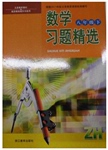题目内容
文中共有10处语言错误,每句中最多有两处。错误涉及一个单词的增加、删除或修改。
增加:在缺词处加一个漏字符号(∧),并在其下面写出该加的词。
删除:把多余的词用斜线(\)划掉。
修改:在错的词下划一横线,并在该词下面写出修改后的词。
注意:1.每处错误及其修改均仅限一词;
2.只允许修改10处,多者(从第11处起)不计分。
Dear sir,
I'm glad to recommend (推荐) you to my friend Li Ming. Li Ming was born in July 15 , 1974 in Beijing. He graduated from Xisi Primary School in 1986 .
When he was in the middle school, he did good in maths, physics and chemistry and fond of art. After graduating from No. 4 High School, he entered Beijing University study physics. After four year of hard work there, he went to the United States for further study. Because of his excellent work, he get a doctor's degree in physics in this year. He is now in good health but would like to make contributions to our country.I will be most gratefully if you consider my recommendation.
Looking forward to receive your early reply.
1.in改为on
2.good改为well
3.fond of前加was
4.study 前加to
5.year改为years
6.get改为got
7.去掉in
8.but改为and
9.gratefully改为grateful
10.receive改为receiving
【解析】
1.
2.
3.fond of前加was and表示并列结构,be fond of…喜欢;本句使用一般过去时的时态。
4.study 前加to 句意:去北京学习物理,表目的。
5.
6.
7.
8.
9.
10. 本句的to是介词,后面要接动名词的形式。
考点:短文改错。

 习题精选系列答案
习题精选系列答案